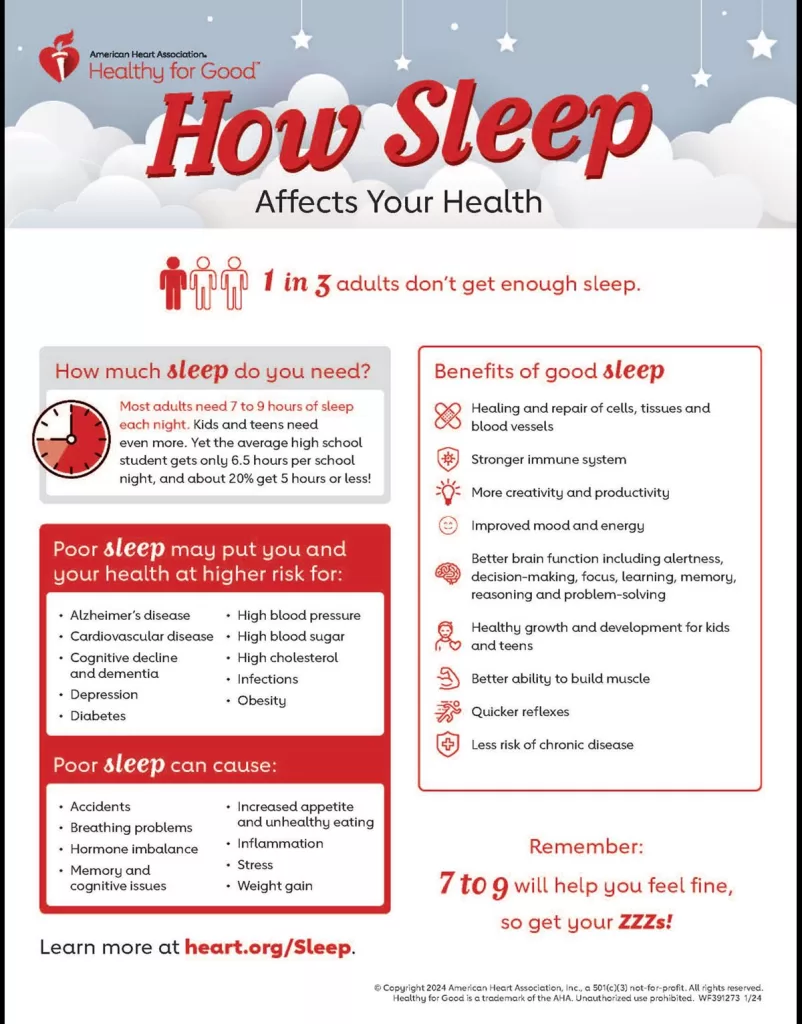
February is National Heart Month, a time to spotlight heart health and encourage lifestyle changes to reduce the risk of heart disease. While discussions about exercise, diet, and smoking cessation often dominate, the importance of sleep—especially its role in heart health and overall well-being—should not be overlooked.
Poor sleep quality is linked to stress, impaired pain management, and even chronic conditions like rheumatoid arthritis (RA), but it’s also a significant risk factor for heart disease. Understanding the connection between sleep and heart health can inspire better habits and improve overall quality of life.
Why Sleep Matters for Your Heart
Sleep isn’t just about rest; it’s a restorative process that plays a critical role in maintaining physical and mental health. Quality sleep regulates stress hormones, supports immune function, and reduces inflammation—factors directly affecting heart health. When sleep is disrupted, the body’s stress hormone levels, like cortisol, can rise, potentially leading to high blood pressure and increased heart disease risk.
For individuals managing chronic conditions, disrupted sleep can intensify symptoms, including fatigue and pain, while undermining the ability to handle stress effectively. Even those without chronic illness face heightened risks of cardiovascular disease, diabetes, and obesity due to insufficient or poor-quality sleep.
Fragmented sleep—where interruptions prevent the body from completing its restorative cycles—is a common issue that has broader implications than feeling tired. Sleep fragmentation can interfere with the deepest stages of rest, during which the body repairs tissue and reduces inflammation.
For people managing any health condition, a lack of this restorative sleep can exacerbate symptoms, such as increased sensitivity to pain and higher levels of fatigue. These disruptions can also impair cognitive functions, mood, and daily productivity, adding to stress levels that negatively affect the heart.
If fragmented sleep is a persistent problem, a primary sleep disorder, like sleep apnea or restless legs syndrome, may be to blame. These disorders often go undiagnosed but are treatable with the help of a healthcare professional. A sleep study, if recommended, can uncover underlying causes of poor sleep, helping to improve both sleep quality and heart health.
Heart disease is the leading cause of death for women. Not getting enough sleep increases the chances of heart disease, heart attack, and stroke by 75%.
Tips for Better Sleep
Incorporating heart-healthy sleep habits into your lifestyle can enhance both your cardiovascular health and overall well-being. Here are some strategies to get started:
- Prioritize a Consistent Sleep Schedule
Your wake-up and bedtime should be the same every day, even on weekends. A consistent routine helps regulate your body’s internal clock, promoting better sleep. - Create a Sleep-Friendly Environment
Make your bedroom an oasis. Keep the room dark, quiet, and cool. Consider blackout curtains, white noise machines, or calming scents like lavender. - Limit Stimulants and Screen Time
Avoid caffeine and heavy meals in the evening. Reduce exposure to screens, such as phones and tablets, at least an hour before bedtime to minimize blue light’s impact on melatonin production. - Incorporate Relaxation Techniques
Before bed, try practices like deep breathing, meditation, or progressive muscle relaxation. These can lower heart rate and prepare your body for rest. - Monitor Physical Activity and Diet
Engage in regular exercise, but avoid vigorous activity close to bedtime. Opt for heart-healthy meals that include whole grains, lean proteins, and plenty of vegetables.
National Heart Month is an ideal time to reflect on the lifestyle changes that can protect your heart. Quality sleep not only improves how your body handles stress and pain but also plays a crucial role in reducing heart disease risk.
If sleep problems persist, connect with your physician to explore potential causes, whether related to chronic conditions, stress, or an undiagnosed sleep disorder. Small steps toward better sleep can lead to significant improvements in both heart health and overall well-being. The Alaska Sleep Clinic can partner with you for a better night’s rest and sleep health.
Alaska Sleep Clinic is participating in the Anchorage Go Red for Women’s silent auction on February 14 @ the Denain’a Center. Come bid on a travel CPAP machine or any of the other amazing items. Get tickets now @ www.heart.org/AnchorageGoRed .








